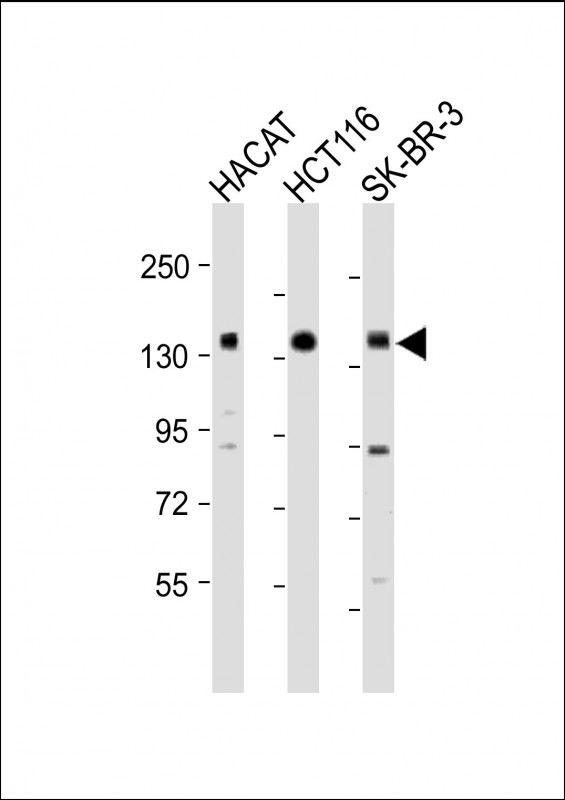
| WB | 1/1000-1/2000 | Human,Mouse,Rat |
| IF | 咨询技术 | Human,Mouse,Rat |
| IHC | 咨询技术 | Human,Mouse,Rat |
| ICC | 技术咨询 | Human,Mouse,Rat |
| FCM | 咨询技术 | Human,Mouse,Rat |
| Elisa | 咨询技术 | Human,Mouse,Rat |
| Aliases | Macrophage-stimulating protein receptor, MSP receptor, 2.7.10.1, CDw136, Protein-tyrosine kinase 8, p185-Ron, CD136, Macrophage-stimulating protein receptor alpha chain, Macrophage-stimulating protein receptor beta chain, MST1R, PTK8, RON |
| Entrez GeneID | 4486 |
| WB Predicted band size | 152.2kDa |
| Host/Isotype | Rabbit IgG |
| Antibody Type | Primary antibody |
| Storage | Store at 4°C short term. Aliquot and store at -20°C long term. Avoid freeze/thaw cycles. |
| Species Reactivity | Human |
| Immunogen | This MST1R antibody is generated from a rabbit immunized with a KLH conjugated synthetic peptide between 600-633 amino acids from the Central region of human MST1R. |
+ +
以下是关于MST1R抗体的3篇参考文献及其摘要概括:
---
1. **文献名称**:*Therapeutic Targeting of RON Receptor Tyrosine Kinase by a Novel Antibody-Drug Conjugate in Pancreatic Cancer*
**作者**:Zhou Y, et al.
**摘要**:研究开发了一种靶向MST1R(RON)的抗体药物偶联物(ADC),在胰腺癌模型中显著抑制肿瘤生长。抗体通过特异性结合RON阻断下游信号通路,并递送细胞毒性药物,显示协同抗肿瘤效果。
2. **文献名称**:*A Humanized Anti-MST1R Antibody Suppresses Tumor Metastasis via Inhibition of Epithelial-Mesenchymal Transition*
**作者**:Chen X, et al.
**摘要**:该研究报道了一种人源化抗MST1R抗体,可抑制肿瘤细胞的上皮-间质转化(EMT),从而减少转移。实验表明抗体通过阻断RON/MSP信号轴降低侵袭性,在乳腺癌模型中延长生存期。
3. **文献名称**:*RON-Specific Antibody as a Diagnostic Marker for Invasive Bladder Cancer*
**作者**:Kim H, et al.
**摘要**:研究验证了一种抗MST1R单克隆抗体在膀胱癌诊断中的应用。结果显示,RON在侵袭性肿瘤中高表达,抗体可用于组织样本检测,与患者预后不良显著相关。
---
以上文献聚焦于MST1R抗体在癌症治疗、转移抑制及诊断中的应用,涵盖机制研究、药物开发及临床前模型验证。如需具体文献链接或补充,可进一步提供数据库检索支持。
The MST1R antibody targets the MST1R (Macrophage-stimulating 1 receptor) protein, also known as RON (Receptor d’Origine Nantais), a transmembrane tyrosine kinase receptor belonging to the MET proto-oncogene family. MST1R plays a critical role in cellular signaling pathways regulating proliferation, migration, and survival. It is activated by its ligand, macrophage-stimulating protein (MSP), leading to dimerization, autophosphorylation, and downstream activation of effectors like PI3K/AKT, MAPK, and STAT3. Dysregulation of MST1R signaling is implicated in cancer progression, metastasis, and therapeutic resistance, particularly in epithelial cancers (e.g., breast, lung, colon). Overexpression or aberrant activation of MST1R correlates with poor prognosis, making it a potential therapeutic target.
MST1R antibodies are essential tools for studying its expression, localization, and function in both normal and pathological contexts. In research, they are used in techniques such as Western blotting, immunohistochemistry (IHC), and flow cytometry to assess protein levels in tissues or cell lines. Therapeutically, monoclonal antibodies against MST1R are under investigation to block ligand binding or inhibit kinase activity, aiming to suppress tumor growth and metastasis. Challenges include optimizing specificity to avoid off-target effects and overcoming resistance mechanisms. Current studies also explore MST1R's role in the tumor microenvironment, immune modulation, and combination therapies with chemotherapy or immunotherapy. Overall, MST1R antibodies hold significant promise in advancing cancer diagnostics and targeted treatments.
×